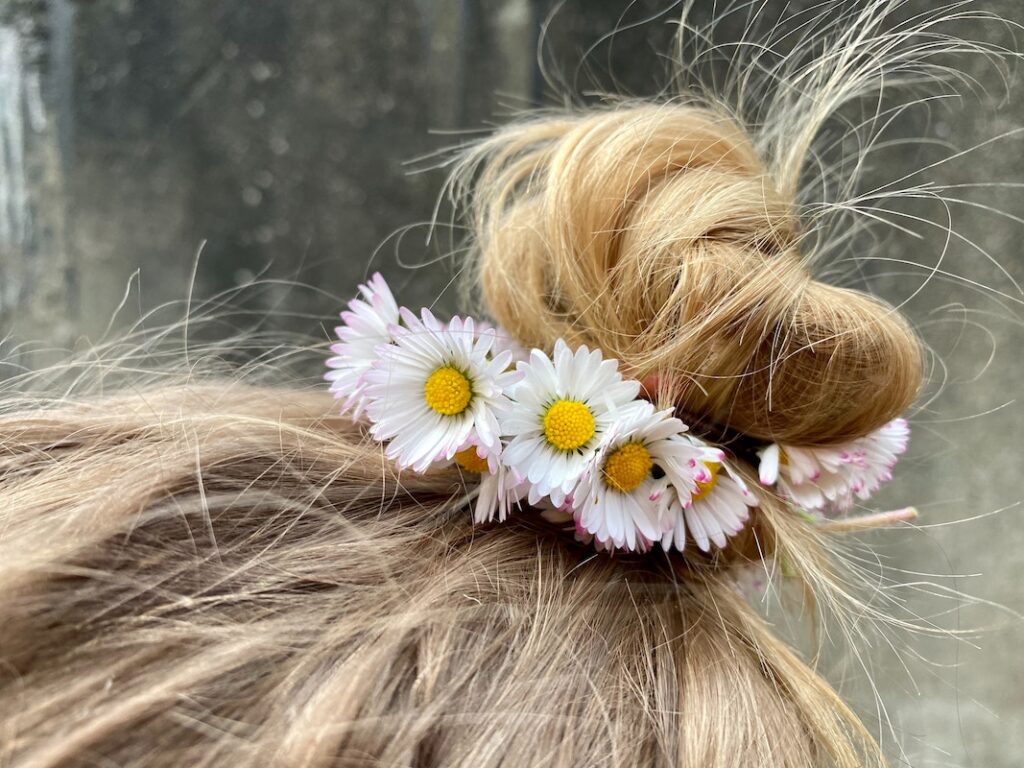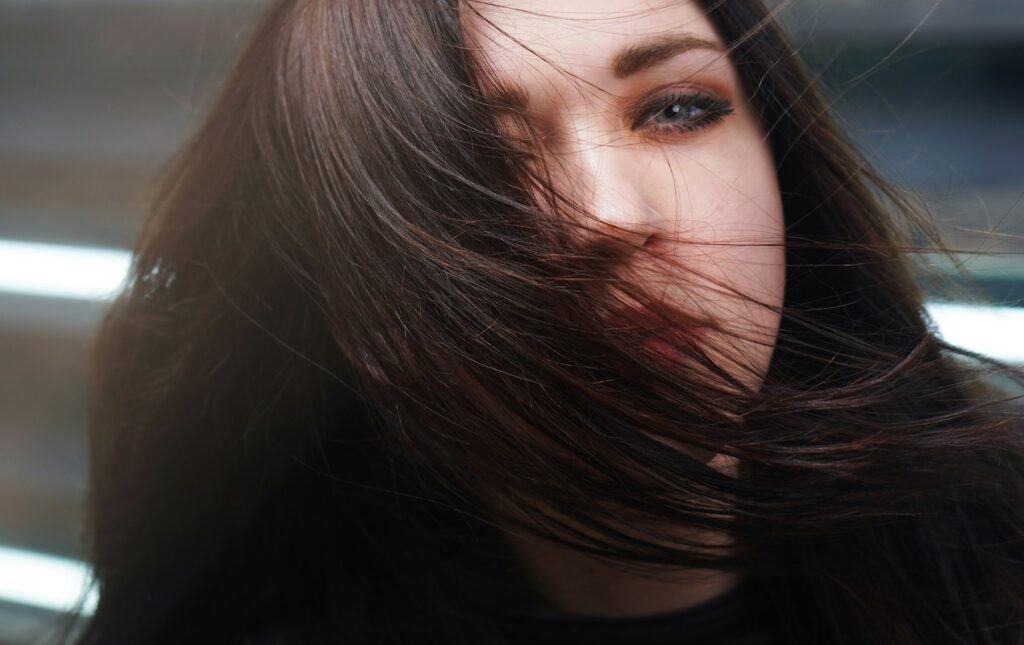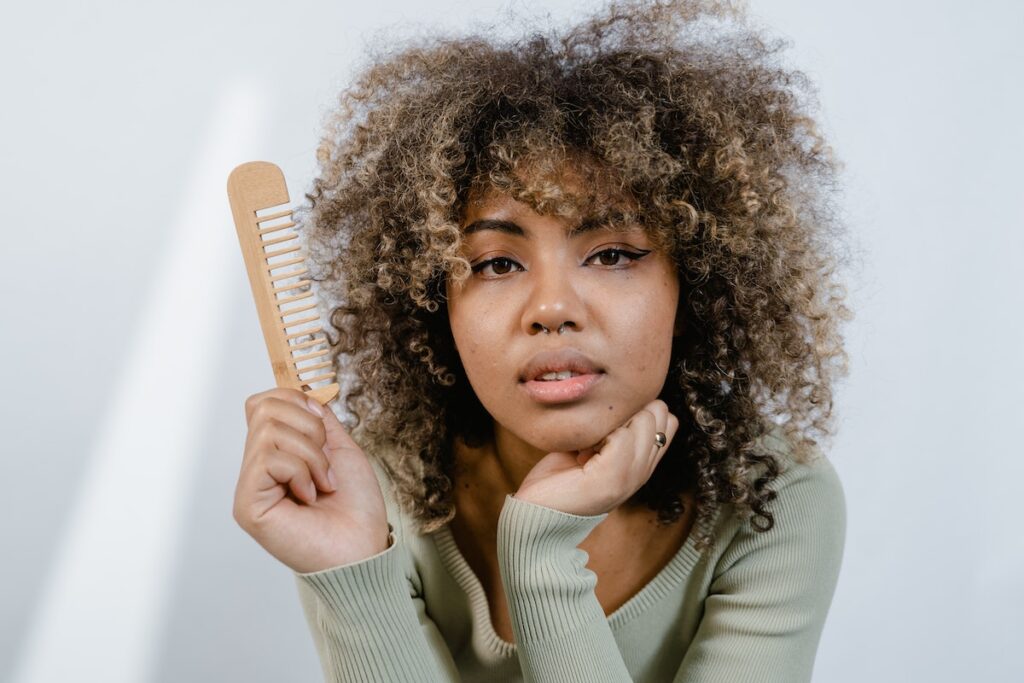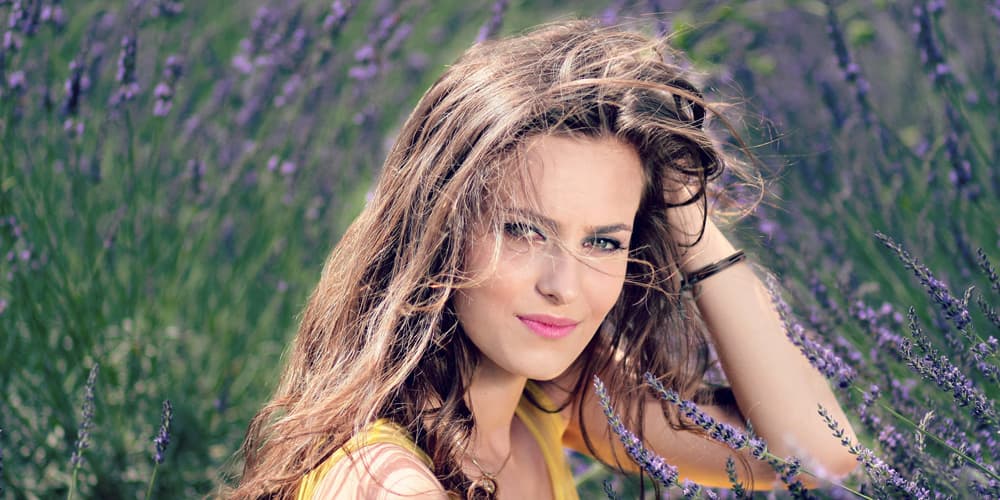Having a dry scalp isn't necessarily a problem - we wash our hair less often and it's actually quite practical. But when you notice that your scalp is 'pulling', that you're experiencing a feeling of discomfort, reinforced by the presence of itching, and that you're noticing the appearance of dandruff, then it's high time to take action.
Above all, with a dry or very dry scalp, it is inevitable that hair suffers. It's also the case that after washing, you end up with damaged hair that doesn't detangle properly, with dry, split ends and dull, rough hair that looks like straw. What care products should you choose to repair very dry hair after washing? What is the right thing to do and good products to nourish extremely dry hair, brittle and fragile hair? We all ask ourselves these questions (women and men alike need the right treatment for dry, very dry or even ultra-dry hair!)
To effectively treat excessive dryness of the scalp and hair, you need to understand why you have a dry scalp. Then you need to repair it with a specially formulated soothing treatment combined with a gentle hair routine that won't damage the hair fibre or the epidermis.
Clauderer's specialists are here to help and provide you with solutions to repair and moisturise dry hair and explain how to make your hair less dry. We also give you tips on how to make homemade masks that will nourish and care for very dry, brittle hair.
Why do some men and women have dry hair?
When dryness of the scalp becomes a problem to the point of causing dandruff and unbearable itching, it's important to know why so that you can respond with the best possible treatment. This is all the more important as the condition has consequences for the health and beauty of the hair.

A scalp that's too dry = hair that's in poor condition, dehydrated, devitalized, dull and brittle.

A healthy scalp = healthy hair.
Lack of sebum :
The main cause of dry or very dry hair is that the sebaceous glands are not producing enough sebum. How does the sebaceous gland work? The sebaceous gland is connected to each hair follicle and produces the sebum that penetrates the epidermis to moisturise and lubricate the skin of the scalp and the hair. In sufficient quantity, sebum has a dual action: both moisturising (the skin remains supple and soft) and protective (the hydrolipidic barrier maintains an optimum level of hydration and protects the scalp and hair from external aggression).
Unfortunately, sebum production is mainly dictated by our genes. As a result, there's very little we can do to change this parameter once it's set by our genes - it's hereditary. This condition affects both men and women. It is often a characteristic of curly hair.

Damage to the lipid barrier (external causes) :
Hair can also temporarily become dry for reasons outside its genetically determined function. These include, of course, the use of overly aggressive shampoos which, when rinsed, wash away some of the sebum film surrounding the hair but also damage the ceramides that hold together the 'scales' that make up the cuticle (the outer part of the hair). Some treatment shampoos (as part of a treatment against seborrheic dermatitis for example) can, if used for too long, attack the epidermis and cause redness and itching on the skin of the scalp, or even a resurgence of dandruff: you can keep the scalp moisturised with a soothing pre-shampoo milk in this case.
After using this type of shampoo, your hair will have a tendency to crunch without a repairing treatment (Crème Clauderer or Baume Clauderer).
Of course, there are other causes of dry hair, such as prolonged exposure to the sun, bathing in the sea (salt) or swimming pool (chlorine), frequent colouring and regular use of a curling iron or straightener.
Finally, there's the blow-drying ritual. Many of us use the hairdryer immediately after rinsing out our shampoo, so our hair is still very wet. And to make it go faster, they set the hair dryer on a high temperature and deliver this very hot air just a few centimetres from the hair. Drying effect guaranteed! The best way to dry your hair without damaging it is to start by dabbing it with a towel, without rubbing it. Then finish off with a hairdryer, set on a lukewarm temperature and not closer than 20 centimetres to the hair while it's still damp. This drying technique will prevent dry hair from appearing.
Symptoms of an overly dry scalp and very dry hair
What are these symptoms? They're quite simple. The scalp may develop red patches and become sensitive and irritated.
The hair will be dry, even very dry, rough and may even look like straw...
The first visible sign will be linked to insufficient sebum nutrition of the outer part of the hair, the cuticle. The ceramides that ensure the cohesion of the "protective tiles" that make up the cuticle play their role much less effectively. And the signs of this weakening can be seen with the naked eye: dry hair always becomes less shiny, dull and sad. Apart from the visual appearance, the consequence of this cuticle deficiency is less protection for the inner part of the hair.
The effects of this poorer protection will themselves be multiplied by the lack of supply (via sebum) that the inner part of the hair needs: moisture and lipids. This is when split ends and hair breakage appear... Without appropriate hair care, dry hair won't repair itself, so it needs to be treated and cared for with an appropriate treatment which will compensate for the lack of sebum.
Scalp and hair moisturiser
Treatment for dry and very dry hair: 10 expert tips from Clauderer to restore moisture and combat dry hair
Whether you're a woman or a man, here you'll find advice on how to treat dry or very dry hair with fast, visible results. Don't hesitate to get inspired!
- When you wash your hair, do just one shampoo: the first cleans but the second strips! Use a gentle shampoo. And don't wash your hair too often! However gentle, frequent shampooing can weaken dry hair. Make sure the cleansing base of the product you use is 100% natural.
- Moderate the temperature of your hairdryer and don't overuse straighteners. Your dry hair lacks sebum by nature, so it's unprotected. So don't damage it by exposing it to high temperatures.
- Warning: above all no silicone in the products you use! The first effects of silicones are magical: your dry hair will seem less dry, shinier and easier to detangle. But in reality, silicones form a 'protective' layer around your hair, preventing it from being nourished by sebum. As a result, hair quickly becomes drier and drier and more and more brittle. In short, using hair products containing silicones is a really bad idea when it comes to treating dry hair.
- Sometimes replace a shampoo with an egg yolk. Its components have a blotting effect that will wash your hair without damaging it and, above all, will not damage the sebum that surrounds it. It's a 'grandmother's recipe' that works wonders for maintaining the balance of very dry hair.
- A express home-made treatment : Make masks based on virgin, first cold-pressed organic vegetable oil. Without this information, the mask will be inert and therefore have no curative effect. Before applying the mask, we recommend that you dampen your dry hair slightly. Why do you do this? The water will simply improve the penetration of the repairing and nourishing active ingredients into the dry hair and ensure that the oil spreads more evenly along the hair fibre. The best formulas consist of a combination of several plants whose respective molecular contributions will compensate for the lack of a natural lubricant. These plants cover the dry hair with a protective film (known as film-forming plants). The combination binds to the hair, making it more resistant to breakage and more luminous, but without making it greasy or heavy (Healing Balm No. 56 for example).
- But beware: masks mean regularity and consistency. Masks for dry hair have no effect if you simply place them on your hair like a tray on a table. Apply the mask (to the lengths, not the scalp) and work the product into the scales of the cuticle, kneading and pressing the hair, strand by strand, for several seconds each. The product should then be left on for at least 1/2 hour. Otherwise, the mask will have no effect.
- Beware of preconceived ideas about coconut oil and castor oil, which are often considered miraculous in the treatment of dry to very very dry hair. Used too frequently, castor oil will harden dry hair and ultimately lead to hair breakage. For its part, coconut oilDespite its ultra-nourishing properties, over time it will have the opposite effect! In short, these 2 oils should be used sparingly on dry hair, preferably diluted and alternating with other treatments.
- Beware of sunThe combined action of infrared rays and salt (or chlorine) dries out the scalp and keratin.
- Immediately after swimming in the sea or pool, rinse your dry hair thoroughly without waiting until the end of the day. This simple gesture will allow you to quickly rinse out the ingredients that could dry out your hair even more. In the evening, wash your hair with a rehydrating conditioner to keep your lengths looking beautiful.
- A diet rich in essential fatty acids and vitamin E is recommended. These include: walnut oil, grapeseed oil, sunflower oil (cold pressed), cold sea fish, fish eggs, etc. Taking food supplements containing the same vitamin ingredients is also recommended.
To sum up, treatment for dry hair involves boosting hydration and implementing a caring hair routine.
Answers to your questions about dry hair
Why is my hair dry and damaged?
There are two main reasons for this situation: firstly, your hair lacks sebum by nature. And then, overly aggressive haircare products. The use of unsuitable products can aggravate this phenomenon and damage hair even further. Cosmetic manipulations such as frequent use of a straightening iron, too hot a hairdryer, etc. can also traumatise the hair and make it even drier, brittle and split.
How can I moisturise dry hair?
Dry hair's best friends are virgin vegetable oils first cold-pressed (avocado, argan, jojoba, olive, sweet almond); without these essential characteristics, the oil is said to be 'inert' and will have little or no effect on dry hair. Certain oils, notably coconut oil and castor oil, should never be used pure, as they can dry hair out even more.

